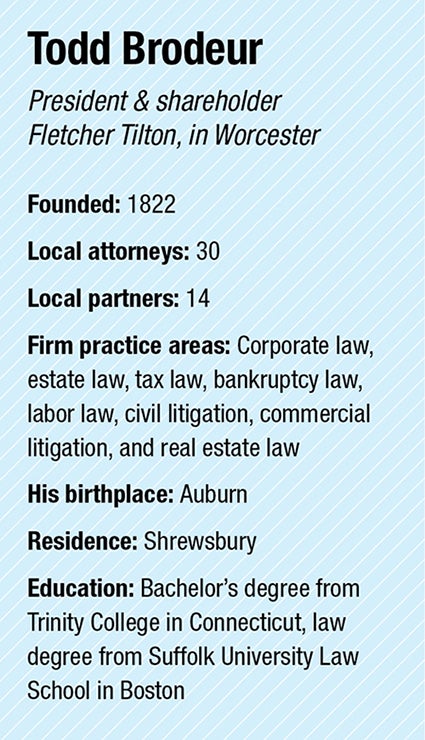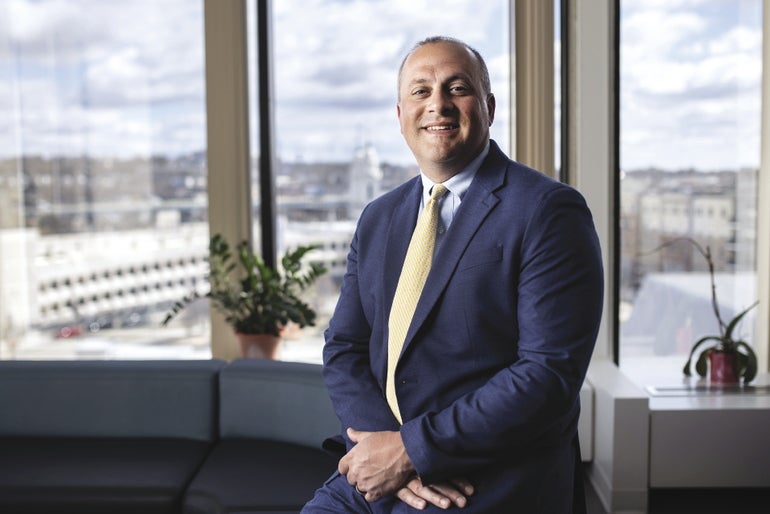As the firm’s new leader, Brodeur aims to cultivate a thriving workplace culture, hire and retain top talent, and strategically navigate evolving technologies to remain ahead in an increasingly dynamic legal landscape.
Get Instant Access to This Article
Subscribe to Worcester Business Journal and get immediate access to all of our subscriber-only content and much more.
- Critical Central Massachusetts business news updated daily.
- Immediate access to all subscriber-only content on our website.
- Bi-weekly print or digital editions of our award-winning publication.
- Special bonus issues like the WBJ Book of Lists.
- Exclusive ticket prize draws for our in-person events.
Click here to purchase a paywall bypass link for this article.
In March, Todd Brodeur was named president of Worcester law firm Fletcher Tilton. The company’s presidential role is a yearly rotating position within Fletcher Tilton’s five-person management group. As the third-largest law firm in Central Massachusetts when ranked by number of local attorneys, Fletcher Tilton provides services throughout a wide range of practice areas including corporate, tax, labor, and real estate law.

As the firm’s new leader, Brodeur aims to cultivate a thriving workplace culture, hire and retain top talent, and strategically navigate evolving technologies to remain ahead in an increasingly dynamic legal landscape.
What does your role as president entail?
Since our executive director departed in January 2024, the management group has intensely managed the firm, both on a day-to-day basis and on strategic initiatives. The president's role is to be the guiding light of the group, pushing issues along, keeping everybody on schedule, and keeping everything running appropriately within the business.
How do you approach your role as president taking into account the position only lasts one year?
The rotating nature of the position fits in with the concept that Fletcher Tilton is a legacy firm, meaning we take over clients passed down from generations before us, and in this case, passing on management responsibilities from person to person throughout the organization.
So for me, it's really about taking over for my predecessor, Mark Donahue, and trying to maintain the focus he brought to the organization and to drive those strategic initiatives he started.
Culture at the office is very important to us. That means how we treat our employees, what we offer for flexibility, the benefits and other programs we offer. We really strive to be the employer of choice within our industry statewide. So I’m looking to continue to attract talent, retain talent, and have happy employees.
What personal goals do you have as president?
The goal is to make sure those strategic initiatives we’re working toward stay in place and stay the priority and the focus of the group, rather than the day-to-day minutia of running the operation.
We’re focusing on succession planning: making sure we’re hiring the right people and then truly integrating them into the team to make sure they feel like they're a part of something, making Fletcher Tilton their home for a long time. Trying to transition clients from one generation to the next takes work. Unlike how you easily switch dentists when one retires, you don't tend to do that with your attorneys. You need to feel very comfortable and trust that person, so transition and succession planning take years.
Improving communication is another key initiative: communication within our three core practice areas: trust and estates work, transactional work, and litigation. It is beneficial to the organization, to our teams, and to our clients to have great communication within those groups.
It's easy to get lost in your little silo.
How have you witnessed the local legal landscape evolve in the past few years?
COVID did a lot of things to a lot of businesses.
It opened up the whole state in terms of opportunities to have employees that live elsewhere but can work at your Worcester-based law firm.
I'm not surprised by some of the Boston firms trying to push westward and come to Worcester. To me, Worcester is a great place to live and a great place to raise a family at a little bit more of an affordable pace than it is in the Boston suburbs. For that reason, we're constantly competing a bit more on the statewide level.
Speaking of Boston firms stretching into Worcester, in July the city saw a number of high-performing lawyers leave the city’s prominent law firm Bowditch & Dewey to join Boston-based firm Prince Lobel Tye’s Worcester office. How has that affected the local legal ecosystem?
I always say the folks we knew at Bowditch who went to Prince Lobel are the same people, they're just wearing a different uniform.
Today, we're playing against a slightly different team in that sense, but they're the same people.
You'll see more movement within the legal industry. You'll see some consolidation, including in Worcester. There are lots of smaller firms for which it’s difficult to keep up with the technology and the investment needed in order to keep up with some of the medium or larger firms.
In what ways do you feel evolving technology and the rise of AI have affected Fletcher Tilton and the broader legal industry?
The legal industry is probably slow to adopt new technologies in general, and it’s the same with AI. We are using AI a little bit at this point with our eye on what it can really do for us moving forward.
There's no replacing picking up a phone and talking somebody through a problem. AI can't do that, but what AI can do is potentially produce a first draft of a document.
Once it's given some key information, it can produce a stock letter, or a form letter, or a form-driven process. That's where we see AI being the most useful and helpful.
I don't think we'll see AI doing much in terms of replacing the people we utilize every day to do the work that we do. It'll help make some of the processes more efficient, but we still need lawyers to do exactly what they do, and that's to advise clients.
It's really our deep relationships with people in this community in particular that's the mainstay for us. We’re not going anywhere.
This interview was conducted and edited for length and clarity by WBJ Staff Writer Mica Kanner-Mascolo.

